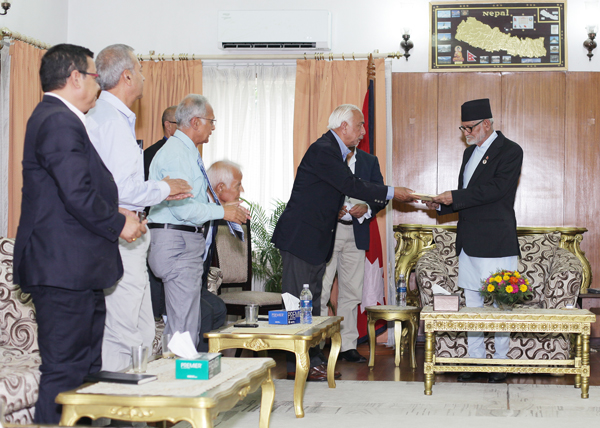Action plan to implement Mathema report submitted
The govt has decided to provide teaching hospitals outside the Valley with incentives like land lease and tax remission
Kathmandu, August 22
A sub-committee formed to study, analyse, and discuss with stakeholders about implementation of a report on medical education, prepared by Kedar Bhakta Mathema-led high-level task force, has formulated and submitted its detailed action plan to the Social Committee of the Cabinet.
The Social Committee, on August 4, had constituted a sub-committee and assigned it the task of formulating the action plan so as to implement the National Policy Report on Medical Education prepared by the eight-member Mathema panel.
The sub-committee is led by National Planning Commission member Yagya Bahadur Karki, along with secretaries of the Ministry of Finance, Ministry of Education, and Ministry of Health and Population.
The report was submitted to Prime Minister Sushil Koirala on June 29.
According to the Office of the Prime Minister and Council of Ministers, the detailed action plan formulated by the Karki-led sub-committee was submitted to the Social Committee yesterday, following discussion on various issues regarding the implementation of the report submitted by the Mathema panel.
Uttam Kumar Khatri, joint secretary and spokesperson at OPMCM, said the government had decided to write to the concerned ministries for early implementation of all the recommendations, barring a few exceptions, made in the Mathema report.
The issues that needed further study for implementation are related to affiliation of medical colleges, students’ quota in medical and dental colleges, fee for MBBS level, Health Professional Education Commission, selection of leadership in medical education institutions, Ayurved Council, and prohibition of issuance of Letter of Intent to new nursing colleges until the next five years.
OPMCM said the government had decided to provide teaching hospitals outside Kathmandu Valley, which are yet to come into operation, with incentives (land lease, tax remission) and to establish at least one medical college in each development region. The government will make a provision of providing affiliation of Purbanchal, Pokhara, mid-western, and far-western universities to medical colleges only in the respective regions, while revoking affiliation of such colleges that fail to achieve more than 75 per cent marks for two years in a row as per the yardstick prepared by Nepal Medical Council.
The government will also make a provision of a Common National Entrance Exam of MBBS and maximum annual fee for MBBS as well as Bachelor of Dental Surgery levels by bringing about uniformity in question papers and fee structures.
According to the action plan, the total fee for MD and Master of Dental Surgery will not exceed four million rupees. Pass marks of the entrance exam will be fixed at 60 per cent and issues of communication skills, critical thinking, moral science, humanities, and behavioral science will be incorporated in the entrance exam. The students will be selected for MBBS and BDS programme on the basis of merit list.
Earlier, Dr Govinda KC, who has repeatedly staged fast-unto-death demanding reforms in Nepal’s medical education sector and guarantee of people’s right to quality health services, had warned of resorting to another round of protest if his six-point demands, including the implementation of the Mathema report, were not fulfilled.






